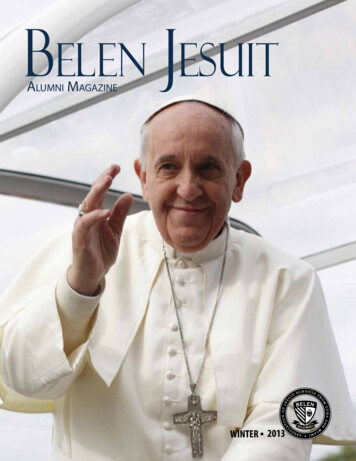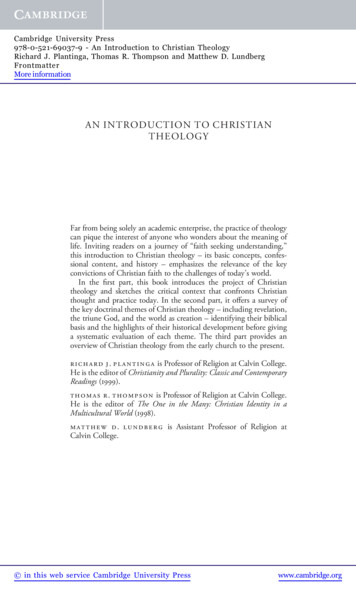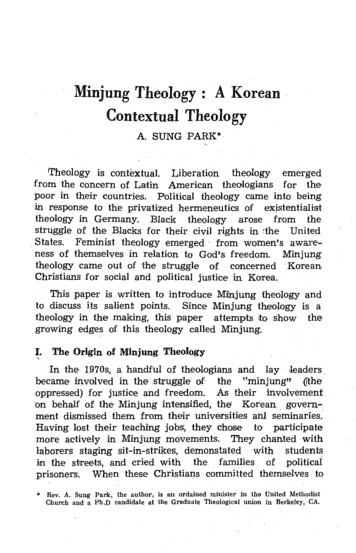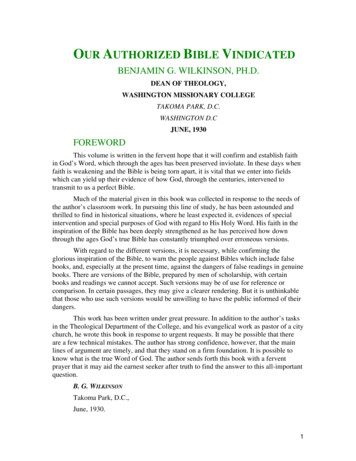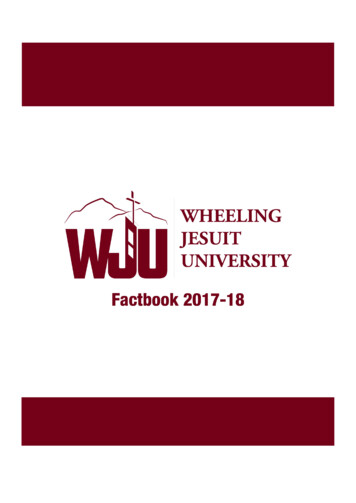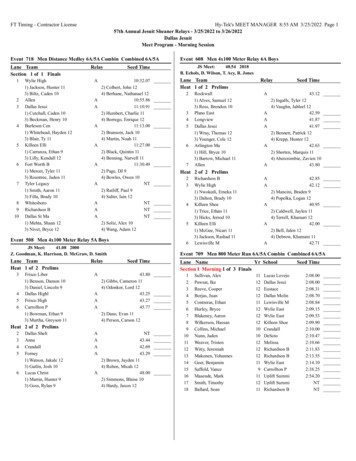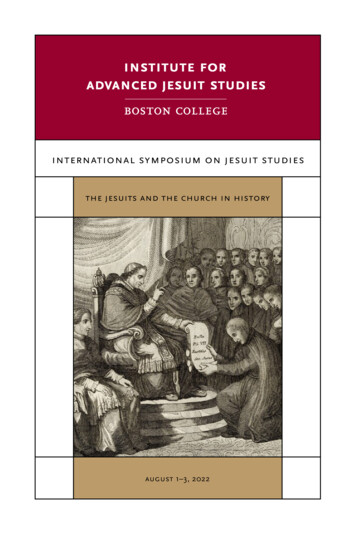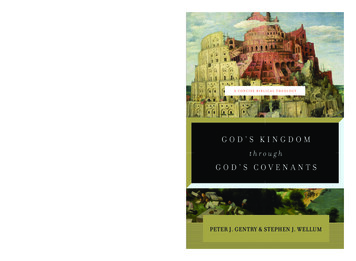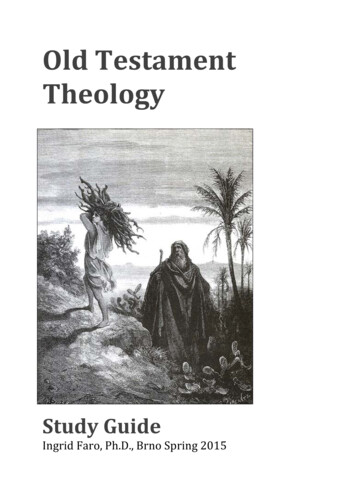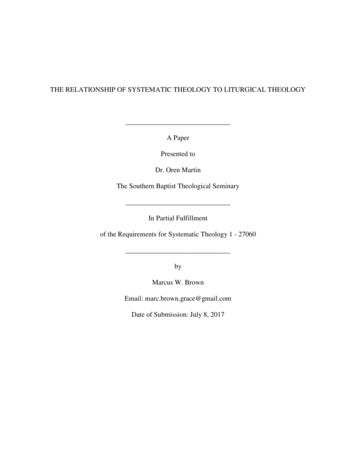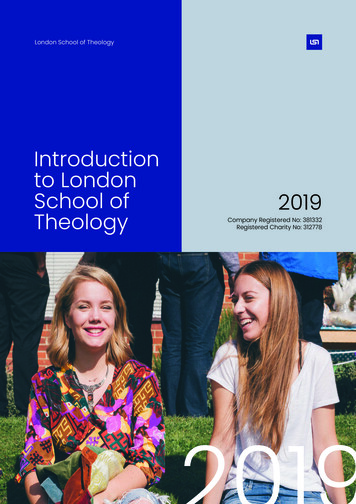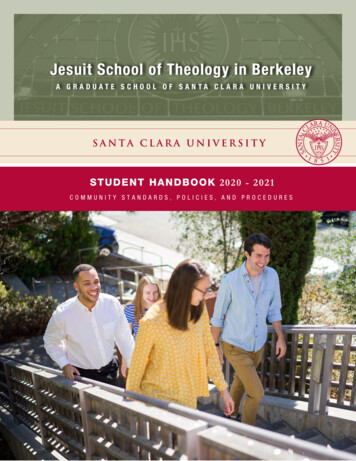
Transcription
Jesuit School of Theology in BerkeleyA GRADUATE SCHOOL OF SANTA CLARA UNIVERSITYST UD ENT H AN DBOOK 2020 - 2021COMMUNITY STANDARDS, POLICIES, AND PROCEDURES
STATEMENT OF STUDENT RESPONSIBILITYYou and Santa Clara University share the responsibilityfor your education. In keeping with this commitment,the University has developed a Student ConductCode and related standards, policies, and proceduresto guarantee each student’s freedom to learn and toprotect the fundamental rights of others. The conceptof rights and freedoms carries with it correspondingresponsibilities for which students are accountable.It is the responsibility of all students, undergraduateand graduate, those living on campus and off campus,to know and abide by the standards, policies, andprocedures that govern their conduct as membersof the University community.
Jesuit School of Theology in BerkeleyA GRADUATE SCHOOL OF SANTA CLARA UNIVERSITYST UD ENT H AN DBOOK 2020- 2021COMMUNITY STANDARDS, POLICIES, AND PROCEDURES
WelcomeDear Student,Welcome to the Jesuit School of Theology of Santa Clara University (JST-SCU). To quote our mission statement:“the Jesuit School of Theology educates scholars and ministers to serve the Church and society by enlivening faith, promotingreconciliation, laboring for justice, and participating in God’s mercy. We bring theology into dialogue with communities, with theirparticular histories and cultures, serving people and learning from them in a spirit of solidarity.”Here at the Jesuit School of Theology, you will study and grow in an international community engaged in theological inquiry,pastoral formation, and professional and spiritual renewal. We are women and men; lay and religious; Roman Catholics andpersons of other religious traditions. Diverse in charism and cultural identity, we are united in our shared commitment to honorand learn from each other. As members of the Graduate Theological Union, we strive for ecumenical and interfaith understandingalong with our fellow schools in the consortium. As a graduate school of Santa Clara University, we explore the intersection oftheology with other disciplines and participate fully in the life of the University.Our faculty and staff are ready to support you in your educational goals and in your ongoing formation. We encourage you to availyourself fully of all the resources in the school community that will further your learning and growth in wholeness.This handbook articulates the values of the Jesuit School of Theology of Santa Clara University, the policies that support them, andyour responsibility in upholding these values as a member of the school and university community. Please read and givethe handbook your careful attention.Once again, welcome to the JST-SCU community and best wishes for this academic year.Sincerely,Paul A. KircherAssistant Dean of Students2 S A NTA CL AR A UNI V E R SI TY
Table of ContentsCOMMUNITY STANDARDSIntroduction. . . . . . . . . . . . . . . . . . . . . . . . . . . . . . . . . . . . . 4Statement of Community Values. . . . . . . . . . . . . . . . . . . . . . 4Statement of Responsibilities and Standards of Conduct. . . . 4Student Conduct Code. . . . . . . . . . . . . . . . . . . . . . . . . . . . . 5UNIVERSITY STANDARDS, POLICIES, AND PROCEDURESAcademic Integrity . . . . . . . . . . . . . . . . . . . . . . . . . . . . . . . . 8Policy for Withdrawal for Health Reasons . . . . . . . . . . . . . . 15Nondiscrimination Policy . . . . . . . . . . . . . . . . . . . . . . . . . . 15Nondiscrimination Procedures Withinthe GraduateTheological Union . . . . . . . . . . . . . . . . . . . 15Posting Printed Material . . . . . . . . . . . . . . . . . . . . . . . . . . . 16Pregnancy Resources . . . . . . . . . . . . . . . . . . . . . . . . . . . . . . 16Gender-Based Discrimination and Sexual MisconductAccess Card Policy . . . . . . . . . . . . . . . . . . . . . . . . . . . . . . . . 8Policy Purpose Statement . . . . . . . . . . . . . . . . . . . . . . . . 16Alcoholic Beverage Policy . . . . . . . . . . . . . . . . . . . . . . . . . . . 8Sexually Transmitted Infections . . . . . . . . . . . . . . . . . . . . . . 17Responsible Hosting of Events Where Alcohol is Served . . . . 9Smoke-Free and Tobacco-Free Policy . . . . . . . . . . . . . . . . . . 17Alcohol Policy Within University Housing . . . . . . . . . . . . . 10Solicitation Policy . . . . . . . . . . . . . . . . . . . . . . . . . . . . . . . . 18Bereavement Resources . . . . . . . . . . . . . . . . . . . . . . . . . . . . . . 10Student Records and Release of Information . . . . . . . . . . . . 18Bias Incident Reporting . . . . . . . . . . . . . . . . . . . . . . . . . . . . . . 11Transportation . . . . . . . . . . . . . . . . . . . . . . . . . . . . . . . . . . 19Building Evacuation and Fire Safety . . . . . . . . . . . . . . . . . . 11Communicable Diseases Policy . . . . . . . . . . . . . . . . . . . . . . 12STUDENT CONDUCT SYSTEMComputing and Electronic Resources Policy . . . . . . . . . . . . 12University Conduct Officers and Boards . . . . . . . . . . . . . . . 20Contraception Availability Policy Statement . . . . . . . . . . . . 12Student Responsibilities and Rights. . . . . . . . . . . . . . . . . . . 21Crime Reporting. . . . . . . . . . . . . . . . . . . . . . . . . . . . . . . . . 12Communications with the Student Regarding the ConductDeath of a Student or Parent . . . . . . . . . . . . . . . . . . . . . . . . 13Office of Accessible Education (formerly DisabilitiesResources) . . . . . . . . . . . . . . . . . . . . . . . . . . 13Title IX and Americans with Disabilities Act . . . . . . . . . . . . 13Drug-Free Policies . . . . . . . . . . . . . . . . . . . . . . . . . . . . . . . 13Eating Disorders . . . . . . . . . . . . . . . . . . . . . . . . . . . . . . . . . 14Code Matter . . . . . . . . . . . . . . . . . . . . . . . . . . . . . . . . . . 21Procedures for Reviewing Allegations of Gender-BasedDiscrimination and Sexual Misconduct . . . . . . . . . . . . . . 23Disciplinary Actions . . . . . . . . . . . . . . . . . . . . . . . . . . . . . . 23Minimum Disciplinary Sanctions for Alcoholand Other Drug Violations . . . . . . . . . . . . . . . . . . . . . . . 24Student Conduct Records Policy . . . . . . . . . . . . . . . . . . . . . 26Marijuana Policy . . . . . . . . . . . . . . . . . . . . . . . . . . . . . . . . . 14Missing Person Notification Policy . . . . . . . . . . . . . . . . . . . 14JESUIT SCHOOL OF THEOLOGY IN BERKELEY3
Community StandardsINTRODUCTIONSTATEMENT OF COMMUNITY VALUESWelcome to the Jesuit School of Theology in Berkeley,a graduate school of Santa Clara University. Santa Clara’sdistinctive tradition expects from each of its communitymembers an uncompromising commitment to excellence andto social responsibility that seeks to fashion a more humane andjust society. Competence, conscience, and compassion are thecornerstones of our community values. To achieve our commongoals, we must create a community environment that is shapedby its expressed values. The Student Handbook seeks to reflectthe values of the community and unite them into a usable guide.The Santa Clara University community is dedicated to thepromotion of values consistent with academic and personalexcellence. Choosing to join this community evidences youracceptance of these values. The following are the values that eachmember of the community is invited to claim as their own:The Santa Clara University community includes students,faculty, staff, parents, alumni, neighbors, guests, and friends ofthe University. As a community, enriched by men and womenof diverse backgrounds, we respect differences, encourageopen dialogue, and commit to caring for all members of thecommunity. Every member of the community serves as arepresentative to other members of our community, both onand off campus. Members of this community freely affiliatewith the University and should be prepared to contribute toand abide by the standards set forth in this handbook.Santa Clara University believes that the life of the University restsin the hands of each and every community member. Sharing thisresponsibility should lead all community members to make themost of their talents, to be sensitive to one another and worktogether, and to seek justice within, and beyond, the Santa ClaraUniversity community.All community members are called upon to promote actionsand behaviors that are consistent with the values of Santa ClaraUniversity and to confront, challenge, and respond to actionsthat are inconsistent with the established standards.This Student Handbook has been designed to frame your rolewithin the Santa Clara University community. Every attempthas been made to provide a clear explanation of the standards,policies, and procedures that reflect the type of community thatyou are joining. Familiarizing yourself with the contents of thishandbook is an investment in time that you will not regret.4 S A NTA CL AR A UNI V E R SI TYAs a member of this community, I will practice personal andacademic integrity.As a member of this community, I will respect and care formyself, others, and their property.As a member of this community, I will value diversity andlearn from diverse people, ideas, and situations.As a member of this community, I will seek, share, andcontribute to the common good.As a member of this community, I will be a leader-in-serviceto the campus and greater community beyond campus.STATEMENT OF RESPONSIBILITIES AND STANDARDS OF CONDUCTA goal of Santa Clara University is to provide students witha general education so that they will acquire the knowledge, skills,and wisdom to deal with and contribute to contemporary society inconstructive ways. As an institution of higher education rooted inthe Jesuit tradition, the University is committed to creating andsustaining an environment that facilitates not only academicdevelopment, but also the personal and spiritual development ofits members.This commitment of the University encourages the greatest possibledegree of freedom for individual choice and expression, with theexpectation that individual members of the community will: Be honest Demonstrate respect for oneself Demonstrate respect for others and property Demonstrate respect for the law and University standards,policies, and procedures, their administration, and the processfor changing them
In keeping with this commitment, this Statement of Responsibilitiesand Standards of Conduct and related policies and procedureshave been formulated to guarantee each student’s freedom tolearn and to protect the fundamental rights of others. TheUniversity administration has established standards, policies,and procedures that are necessary to achieve its objectives asa Catholic, Jesuit university. These standards, policies, andprocedures are inclusive of the laws of the nation, the stateof California, and the local community.All members of the Santa Clara University community areexpected to conduct themselves in a manner that is consistentwith the goals of the institution and that demonstrates respectfor self, others, and their property. Students living off campus aremembers of this community and, as such, are representatives ofthe University to the community at large. In this regard, studentsliving off campus maintain an equal measure of accountabilityto the values and expectations of all members of this community,as identified in the Student Conduct Code.Whether living in, or traversing through the neighborhood,or parking on the streets, students are expected to adhere tothe same high standards of conduct and behavior that areconsistent with the students’ developing role as responsible andaccountable citizens and to reflect well upon the Santa ClaraUniversity community.The Assistant Dean of Students at the Jesuit School of Theologyworks under the guidance of the Office of Student Life atSanta Clara University, when addressing matters that pertainto Standards of Conduct.STUDENT CONDUCT CODEAll members of the University community have a strongresponsibility to protect and maintain an academic climate inwhich the fundamental freedom to learn can be enjoyed byall and where the rights and well-being of all members of thecommunity are protected. To this end, certain basic regulationsand policies have been developed to govern the conduct of allstudents, as members of the University community.The University reserves the right to review student conduct thatoccurs on and off campus when such behavior is inconsistent withthese expectations and the Student Conduct Code. In addition,students are responsible for the actions of their guests and willbe held accountable for any violations of University standards,policies, and procedures by a guest. Students should accompanytheir guests while on campus. If necessary, the University reservesthe right to limit the guest privileges of a student.The following acts may subject students to disciplinary action:1. Engaging in any form of academic dishonesty such asplagiarism (i.e., representing the work or ideas of others asone’s own without giving proper acknowledgment), cheating(e.g., copying the work of another person, falsifyinglaboratory data, sabotaging the work of others), and otheracts generally understood to be dishonest by faculty orstudents in an academic context2. Illegal use, possession, or distribution of drugs. The useor possession of equipment, products, or materials thatare used or intended for use in manufacturing, growing,using, or distributing any drug or controlled substance.Possessing, concealing, storing, carrying, or using anydrug paraphernalia as defined in California Health andSafety Code § 11364.5, including, but not limited to,objects intended for use or designed for use in ingesting,inhaling, or otherwise introducing marijuana, cocaine,hashish, or hashish oil into the human body. A reportedviolation of this section will result in the confiscation andimmediate disposal of drugs and drug paraphernalia byUniversity officials3. Falsification or misuse, including non-authentic, altered,or fraudulent misuse, of University records, permits,documents, communication equipment, or identificationcards and government-issued documents4. Knowingly furnishing false or incomplete information tothe University, a University official, or conduct hearingboard in response to an authorized request5. Disorderly, lewd, indecent, or obscene conduct; excessiveor prolonged noise; behavior that interferes with theorderly functioning of the University, or interferes with anindividual’s pursuit of an education on University-ownedor controlled property, or during an authorized Universityclass, field trip, seminar, competition or other meeting, orUniversity-related activity6. Detention, physical abuse, or conduct that threatensimminent bodily harm or endangers the physical well-beingof any person, including harm to self7. Nonconsensual physical contact of a sexual nature suchas sexual misconduct, sexual assault, and rape8. Destruction, damage, or misuse of University propertyor the property of any other person or group9. Theft or conversion of University property or the propertyof any other person or group10. Hazing, harassing, threatening, degrading language oractions, including stalking, or any practice by a group orindividual that degrades a student or employee, endangershealth, jeopardizes personal safety, or interferes with anemployee’s duties or with a student’s class attendance ora person’s educational pursuitsJESUIT SCHOOL OF THEOLOGY IN BERKELEY5
11. Engaging in single or multiple acts – verbal, written, orphysical—in violation of the Student Conduct Codemotivated in whole or in part by a person or group’s actualor perceived race, color, national origin, ancestry, sex,sexual orientation, age, religious creed, physical, or mentaldisability, medical condition, as defined by California law,marital status, citizenship status, gender identity, genderexpression, genetic information, military or veteran status, orother status protected by law, and which has the purpose oreffect of unreasonably and substantially interfering with anindividual’s or group’s safety or security, or which creates anintimidating, hostile, and objectively offensive educational,living or working environment. Bias-related conduct inviolation of the Student Conduct Code on the basis ofactual or perceived religious faith and political affiliation/orientation is also prohibited.12. Making a video recording, audio recording, or streamingaudio/video of private, non-public conversations and/ormeetings, inclusive of the classroom setting, without theknowledge and consent of all recorded parties113. Intentional obstruction or disruption of teaching, research,administration, disciplinary procedures, or other Universityactivities; or obstruction or disruption that interferes withthe freedom of movement, both pedestrian and vehicular14. Possessing, concealing, storing, carrying, or using any real orsimulated weapons (including toy guns). The definition ofweapons includes, but is not limited to, firearms (includingBB/pellet, Airsoft, and paintball guns—regardless of whetherthey are disassembled), knives (switchblade, double-edged,hunting-style [fixed-blade] of any length, throwing, folding[pocket-style with a blade that locks into place], and kniveswith blades of 2.5 inches in length or greater), explosives(including, though not limited to, fireworks and firecrackers),ammunition, dangerous chemicals, or any other dangerousweapons or instruments, or chemicals as defined by, thoughnot limited to, California State Law except if expresslyauthorized by University policy or procedure. A reportedviolation of this section will result in the immediateconfiscation and disposal of real or simulated weapons byUniversity officials1. The recording of classroom lectures, discussions, simulations, and other course-related activityis governed by this University recording policy, which balances the legitimate needs of studentswith disabilities that require the accommodation, the intellectual property concerns of itsinstructors, and the privacy of its students. In some instances, federal law may permit studentswith documented disabilities to record classroom activity. Disability Resources will determineif classroom recording is an appropriate academic adjustment, auxiliary aid, and/or servicewith respect to each individual student’s documentation.6 S A NTA CL AR A UNI V E R SI TY15. Unauthorized entry into, or use or defacement of,University facilities, including residence halls and otherbuildings and grounds, including unauthorized entry into,or presence in or on, a University building; unauthorizederection or use on University property of any structuresincluding specifically, but not limited to, tents, huts,gazebos, shelters, platforms, and public address systems; orunauthorized use of University property for dances, concerts,assemblies, meetings, sleeping, cooking, or eating, if saidactivity interferes with the operation of the University orsurrounding community16. Publication, posting, or distribution through the use ofUniversity resources (e.g., computer networks, telephonelines, email services, Internet connections), or at authorizedUniversity activities of material that violates the law of libel,obscenity, postal regulations, the fair use of copyrightedmaterials, or any law or statute or University policy17. Failure to comply with a reasonable request or order of aUniversity executive or other authorized official(s); refusal orfailure to leave such premises because of conduct prescribedby this code when such conduct constitutes violations of thiscode or a danger to personal safety, property, or educationalor other appropriate University activities on such premises;or refusal or failure to identify oneself when requested bya University official provided the official is identified andindicates legitimate reason for the request18. Possession, consumption, sale, or action under the influenceof alcoholic beverages by persons under the age of 21;furnishing alcoholic beverages to persons under the age of21; consumption of alcoholic beverages in a public place(all areas other than individual residences, private offices,and scheduled private functions); excessive and inappropriateuse of alcoholic beverages. (See also “Alcohol Policy WithinUniversity Housing” on page 10.) A reported violation ofthis section will result in the confiscation and immediatedisposal of alcoholic beverages and related equipment19. Engaging in acts or deeds that may violate existing federal,state, county or municipal laws or ordinances that materiallyor adversely affect the individual’s suitability as a member ofthe Santa Clara University community20. Tampering with, removing, damaging, or destroying fireextinguishers, fire alarm boxes, smoke or heat detectors,emergency call boxes, and other safety equipment anywhereon University property; creating a fire, safety, or healthhazard; or failure to respond to fire alarms, evacuatebuildings during alarm activation, or respond to thedirections of emergency personnel
21. Any behavior that disrupts or causes disruption of computerservices; damages, alters, or destroys data or records;adversely affects computer software, programs, systems, ornetworks; or uses data, computer systems, or networks todevise or execute any scheme to defraud, deceive, extort, orwrongfully obtain money, property, or dataStudents who are alleged to have violated the Student Conduct Codemay be subject to disciplinary action and, if applicable, may also besubject to criminal prosecution.Under the guidance of the Office of Student Life, the Assistant Deanof Students of the Jesuit School of Theology is the primary, thoughnot the only, hearing officer for JST-SCU student conduct cases.JESUIT SCHOOL OF THEOLOGY IN BERKELEY7
University Standards, Policies,and ProceduresThe following standards, policies, and procedures are designed tofoster a climate in which students can succeed during their time atthe University. All students are expected to familiarize themselveswith these standards, policies, and procedures and adhere to them.ACADEMIC INTEGRITYThe JST Plagiarism Policy and the Student Handbookoutline the expectations that all members of the JST-SCUcommunity are expected to be honest in their academicendeavors. Engaging in any form of academic dishonesty orother acts generally understood to be dishonest by faculty orstudents in an academic context subjects a student to academicand disciplinary action. For the full text of the policy,go to plagiarism-policy/.ACCESS CARD POLICYCard UseThe ACCESS card is Santa Clara University’s multipurposephoto identification card which grants SCU library circulationand access to some SCU facilities. The card and access privilegesare nontransferable. The individual identified by the cardis responsible for all usage of his or her card and is the onlyone authorized to present the card for services or access. Astudent using a card that does not belong to him or her mayhave that card confiscated and may be referred to the Officeof Student Life for disciplinary action. The ACCESS CardOffice is responsible for the issuance of all ACCESS cards andthe maintenance of all card reader locations. If a card does notfunction properly at any location, the card owner should seekassistance at the ACCESS Card Office.Lost/Stolen Cards and Replacement FeesThe card owner is responsible for suspending any lost or stolenACCESS card immediately 24 hours a day, seven days a week.The loss may be reported and the card suspended anytimeonline at https://eacct-scu-sp.blackboard.com/eAccounts/8 S A NTA CL AR A UNI V E R SI TYAnonymousHome.aspx, in person at the ACCESS Card Officeduring business hours, or by phone at 408-551-1647. After hours,Campus Safety Services (open 24 hours a day) may be notifiedeither in person, or by phone at 408-554-4441. The card owneris responsible for all card usage prior to the request for cardsuspension, whether the card was used online, at the ACCESSCard Office, or at Campus Safety Services. Damaged or defacedACCESS cards are no longer valid and must be replaced.A 15 fee is charged to replace a lost, stolen, or damaged card.ALCOHOLIC BEVERAGE POLICYThe Alcoholic Beverage Policy of Santa Clara University isbased on the central and fundamental educational focus of theUniversity of creating an environment that fosters learning.The University believes in personal responsibility, moral growthand development, awareness of communal consequences ofpersonal choices, obligation of citizenship, and responsibledecision making. The University strives to build a communitythat is welcoming, hospitable, fair, inclusive, rooted in mutualunderstanding and appreciation, and respectful of diverseperspectives, traditions, and practices. Therefore, it is criticalthat the members of the University community be committed tothe physical and emotional health and well-being of those whowork, study, or congregate at the University. The policy servesas a guide and applies to all members of the campus communityincluding students, parents, staff, faculty, alumni, and guests ofthe University.The Alcoholic Beverage Policy is set in the context of the legalrequirements governing the sale, consumption, and distributionof alcoholic beverages, and in the context of communityexpectations for not only upholding the laws, but also for sharingresponsibility for the safety and welfare of other members of thecommunity. The University will not tolerate disregard for thelaw, or behaviors and practices that counter the education of thewhole person, compromise rigorous and imaginative scholarship,inhibit moral and spiritual development, or constrain theUniversity’s fundamental values. Consequently, the Universitydoes not condone underage drinking and considers intoxication,
disorderliness, or offensive behavior deriving from the use ofalcoholic beverages to be unacceptable, regardless of a person’sage or on-campus or off-campus status.To cultivate a campus environment consistent with the statedgoals and purposes of an educational institution, the Universityhas adopted the following policies and procedures for the use ofalcoholic beverages.1. The service and consumption of alcoholic beverages on theUniversity campus and at University-sponsored events offcampus shall be done in compliance with applicable municipal,state, and federal laws and regulations, and in accordancewith University policies and procedures. All persons on theUniversity campus or at any University-sponsored event offcampus where alcoholic beverages are being served orconsumed are expected to abide by, and respect all such laws,regulations, policies, and procedures. (Copies of applicablelaws are available from the Office of Student Life. See thefollowing section for a partial listing of laws.)2. Alcoholic beverages at events held on campus shall besupplied and sold only by the University food serviceprovider or another designated, licensed agent of theUniversity, except in situations covered by No. 5 of thispolicy. No other individual person or private party shallsupply or sell alcoholic beverages at on-campus events orhold the license for the sale of alcoholic beverages on campus.3. Alcoholic beverages shall not be served or consumed inpublic areas of the University except at authorized Universityevents. Public areas include all indoor and outdoor spaceson the campus except individual residences and privatedepartmental work areas and offices.4. Alcoholic beverages shall not be served or consumed at anyUniversity-sponsored intercollegiate or club sport athleticevent or recreational sports activity.5. The sponsorship of events by alcoholic beverage companiesor distributors is limited to cash donations; donatedproducts (other than those that directly promote oradvertise alcoholic beverages) in support of fundraising orother special events as approved by the appropriate vicepresident, vice provost, or dean; and materials for Universityeducational programs. The use of donated products forevents that are held in Benson Memorial Center mustalso be approved by the University liaison to the foodservice contractor.6. Alcoholic beverages may be served at on-campus eventssponsored by University-affiliated student organizationswhose membership is predominantly 21 years of age orolder, provided that University operating funds are notused to purchase the alcohol for the event.7. The service of alcoholic beverages at all events on campusshall be in accordance with the Office of Student Life’sAlcohol Management Plan, which should be submitted andapproved by the Vice Provost for Student Life or designee.8. For student organization-sponsored events off campus thatinclude the service of alcoholic beverages, and that requireUniversity approval of the contract or agreement with theoff-campus facility, an Addendum to Agreement must besigned by the service provider and received by the ViceProvost for Student Life or designee. (Copies of this addendumare available in the Center for Student Leadership.)RESPONSIBLE HOSTING OF EVENTSWHERE ALCOHOL IS SERVEDThe event manager for events where alcoholic beverages areserved is responsible for implementing the following practices:1. A University-affiliated student organization must identifyan event manager responsible for planning and managingthe event. The event manager must be present throughoutthe entire event and must remain alcohol-free prior to, andduring the event. The event manager and the manager of thefacility or his/her designee will work together to ensure thatall University event planning requirements are met.2. The event manager must complete the Event ManagementPlan for Events with Alcohol and obtain all requiredsignatures prior to the event.3. An appropriate crowd management and security plan shallbe developed for the event to mon
Here at the Jesuit School of Theology, you will study and grow in an international community engaged in theological inquiry, pastoral formation, and professional and spiritual renewal. We are women and men; lay and religious; Roman Catholics and persons of other religious traditions. Diverse in charism and cultural identity, we are united in .
